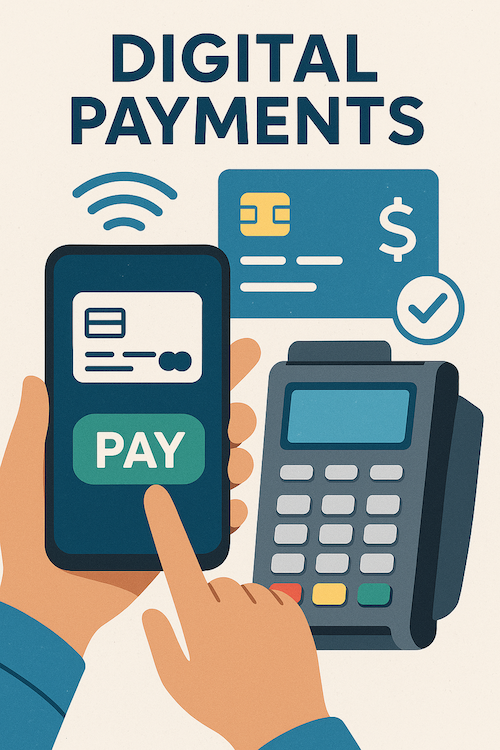By SiliconCaribe News Desk
Jamaica’s digital economy reached a tipping point in 2024. Credit card usage, mobile wallet transactions, and electronic transfers all surged as Jamaicans embraced fast, frictionless financial experiences over legacy systems like cheques and cash. But while the transition spells progress, the Bank of Jamaica (BOJ) is urging caution, warning that the digital transformation also carries growing risks of systemic concentration.
In its newly released 2024 Financial Stability Report, the BOJ confirmed what many startups and fintech observers already sensed: the shift toward real-time, digital payments is accelerating and irreversible.
Credit cards continued to dominate retail transactions, accounting for 65.1% of all retail payment volume, with the average monthly spend per cardholder reaching J$190,500. Meanwhile, electronic payments grew by 19%, and cheque usage continued its steady decline as a result of national efforts to phase out inefficient, paper-based processes.
“We’re seeing a fundamental rewiring of Jamaica’s payment infrastructure and consumer behavior,” the BOJ stated. “Digital engagement is no longer optional. It’s becoming the norm.”
This shift is not just behavioral — it’s infrastructural. Banks scaled back ABM deployments while expanding Point-of-Sale (POS) terminals, growing from 28,899 to 31,836 nationwide by the end of 2024. Jamaicans responded accordingly: the ratio of POS transactions to ABM withdrawals jumped from 1.08 to 1.68, signaling that consumers now swipe or tap far more often than they withdraw.
But the digital boom isn’t only about cardholders.
Mobile wallets, account-based transfers, and other alternative payment tools also posted a 19% spike in usage- a sign that these platforms are reaching underbanked users and SMEs once left behind by traditional banking. The BOJ noted that “automated payment solutions” now serve a broader demographic and are key to building a more inclusive, more resilient financial system.
That system, however, still has fault lines.
Despite all the innovation, two institutions now process 37% of large-value transfers — a dominance the BOJ calls “concentration risk.” The Large-Value Transfer Index (LSCRI) rose again in 2024, reflecting overdependence on a few players, while smaller institutions remain peripheral, handling only 2.5% of the action. The central bank stressed that this dynamic presents a potential systemic vulnerability, even as digital tools increase speed and lower costs.
“Progress must be paired with vigilance,” the BOJ cautioned. “Ongoing oversight of systemically important financial institutions (SIFIs) is critical to safeguarding national stability.”
The broader takeaway? Jamaica’s payment ecosystem is maturing rapidly, and startups, banks, and policymakers alike must work in sync to ensure this new infrastructure remains safe, inclusive, and innovation-friendly.
From credit card dominance to the rise of tap-and-go culture, and retail wallet adoption to real-time bank transfers, Jamaica is building a digital-first economy in real time. But the job isn’t done. As startups, banks, and government agencies deepen their collaboration, the opportunity isn’t just to digitize payments — it’s to rebuild trust, broaden access, and future-proof the Caribbean’s financial systems.
Here are the 10 key takeaways.
1. Massive Growth in Digital Payments
Electronic payments in Jamaica surged 19% in 2024, signaling a major leap in the country’s digital financial transformation.
2. Credit Cards Dominate Retail Payments
Credit cards remained Jamaica’s most used retail payment tool, accounting for 65.1% of retail transactions, with average monthly spend rising to $190,500 per cardholder.
3. Cheques Continue to Decline
The value of cheque payments fell further, as the Bank of Jamaica (BOJ) actively pushed to phase out reliance on outdated payment methods.
4. Infrastructure Shift to Tap-and-Go
The number of Point-of-Sale (POS) terminals increased to 31,836, while ABMs dropped slightly, indicating a strategic shift toward real-time digital payment convenience.
5. POS Over ABM Becomes the Norm
By end-2024, Jamaicans used POS terminals 1.7 times more than ABMs, confirming a behavioral shift toward cashless spending.
6. Digital Wallets and Transfers Surge
‘Other electronic payments’ such as mobile wallets and account-based transfers rose 19%, fueled by increased trust from both consumers and businesses.
7. Settlement Systems See Higher Volumes
High-value payment system JamClear®-RTGS recorded an 11.8% increase in volume (4.3 million transactions), driven by the boom in electronic payments.
8. Efficiency Up, Transaction Value Down
Despite the rise in volume, the total value of RTGS transactions dipped 1.4%, which the BOJ attributed to improved payment efficiency and reduced risk.
9. Systemic Risk: Two Institutions Dominate
37% of large-value transfers were processed by just two institutions, up from 36.4% in 2023, raising red flags about concentration risk and financial system vulnerability.
10. Digital Progress Requires Oversight
While Jamaica’s payment system is becoming more inclusive and resilient, the BOJ warns that continued monitoring of dominant financial institutions is critical to avoid systemic instability.

 eCommerce1 year ago
eCommerce1 year ago